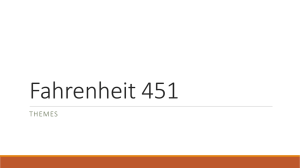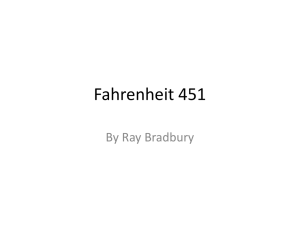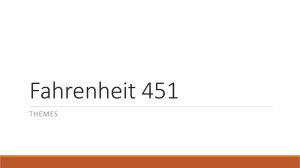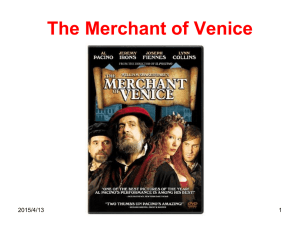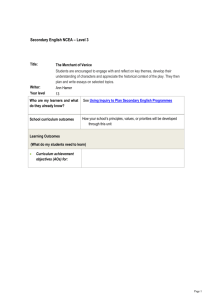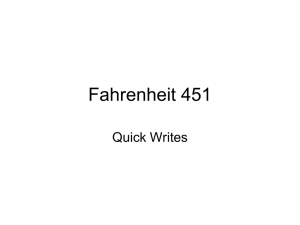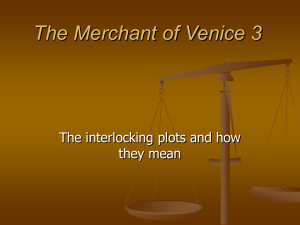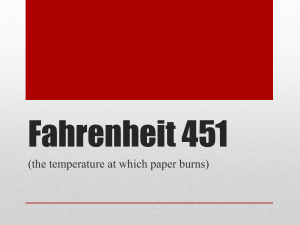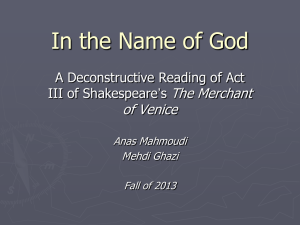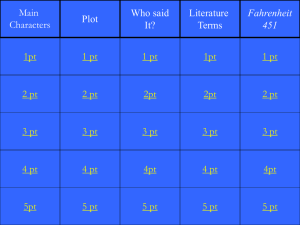Merchant of Venice BTE
advertisement
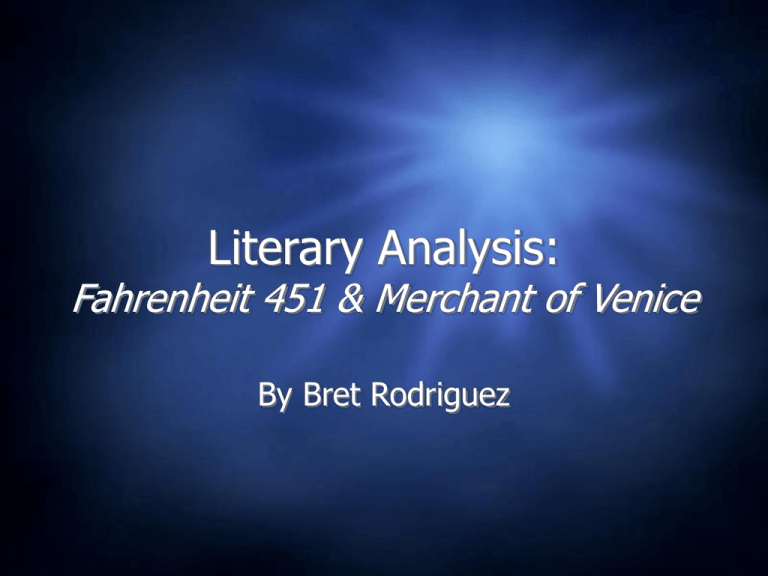
Literary Analysis: Fahrenheit 451 & Merchant of Venice By Bret Rodriguez Choices The choices in Fahrenheit 451 and Merchant of Venice both effected the characters and the outcome of the story. The main characters in both books had to choose between what is right or wrong, good or bad, and even right and easy. Fahrenheit 451 Merchant of Venice • Montag’s choice to kill Beatty • Montag’s choice to keep a book Both • No Mercy • Faber’s choice to show him his listening device • Montag’s choice to listen to Clarisse • Montag’s choice to stand up and not join all the people like Mildred who take the easy path and have “fun.” • Social Outcasts • Being forced to do something against your will • Doing what you believe is right • Shylock chooses to give Antonio the full punishment and not be merciful • Bassanio must choose the correct casket in order to marry Portia • Shylock’s daughter must choose between her father or Lorenzo • Portia has no choice in who must marry her • Antonio must choose between giving Bassanio the money to go to (insert place here) or not in order to keep a good friendship between them • Montag’s choice to be apart of the Book People and make a difference • Antonio choose to join most people and be anti-Semitism against Shylock • The woman on the porch chose to be burned alive with her books • Antonio deprives Shylock of his money and religion and takes a minor role in relationship of Portia and Bassanio • Montag must burn his house • Jessica and Launcelot Gobbo run away from Shylock and join Bassanio and his entourage. Choices (cont.) Merchant of Venice Fahrenheit 451 Easy Way Join People like Mildred Challenging Way Be like Faber Difficult Way Join Book People Both Another similar choice that was made in both books was to choose between the Gold casket, the easy way where you get what you want quickly with not effort. The Silver Casket, you put some effort in but don’t apply it. And the Lead Casket, where you try very hard to get what you want and sacrifice some things. Gold Casket Represents what every man wants. Silver Casket Represents what a man should deserve. Lead Casket Represents the man who choose this must give and risk everything he has. Dualities: Fahrenheit 451 Guy MontagIn the beginning of Fahrenheit 451, Guy Montag begins as a “normal” person who does his job without question. But later in the book you learn that he has been keeping books from the places he was burning. You see he had a bookburning, not knowing side to him and he also had an inquisitive side that question, for instance, why someone would die with their books. Faber and BeattyFaber is the complete opposite of Beatty. While Faber tries to persuade Montag, Beatty tries to manipulate him. Faber is seen as the cowardly guy who is trying to live undetected, where as Beatty is the opinionated man who is living life as if he would die tomorrow. Dualities: Merchant of Venice Portia In the beginning of Merchant of Venice, Portia seems like a woman who will stand by and not care about who becomes her husband or if Antonio dies, but really she is cunning, witty, and intelligent. For example when she gives clues to Bassanio and finds a loophole in Shylock’s bond in order to save Antonio’s life. Social Classes Fahrenheit 451 Applying what they know Guy Montag, Granger The Understanding Clarisse McClellan, Professor Faber Merchant of Venice Fahrenheit 451 and Merchant of Venice both have social classes that divide their society. Merchant of Venice is more about political standing while Fahrenheit 451 is about understanding what is happening. The knowing NoblesPortia, Duke of Venice Rich/PowerfulBassanio, Prince of Morocco, Prince of Arragon Middle Class-Jessica(Shylock’s daughter), Antonio, Captain Beatty Servants- Nerissa, Launcelot Gobbo, Old Gobbo, Leonardo The oblivious/Ignorant Mrs. Bowles, Mildred Montag, Mrs.. Phelps, Merchants-Shylock Conclusion In summary, Fahrenheit 451 and Merchant of Venice are connected by the kinds of choices the characters make, the dualities in the characters, and the social structure that sets those characters apart from one another. Questions? 質問 ~Japanese Fragen? ~German Questions? ~French Vragen ~Dutch Domande? ~Italian Вопросы ~Russian ¿Preguntas? ~Spanish ホハフ� ~ Chinese

